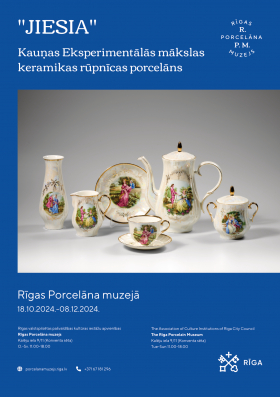-
NEWS
Exhibition "Jiesia"Exhibition of bone china works from the Kaunas Experimental Art Ceramics Factory "Jiesia" at the Riga Porcelain Museum from October 18 to December 8, 2024.
From October 18 to December 8, 2024, the Riga Porcelain Museum invites you to visit the exhibition "Jiesia", where a selection of bone porcelain works from the Kaunas Experimental Art Ceramics Factory "Jiesia" (Lithuania) will be on display. The exhibition offers a unique opportunity to get acquainted with both the history of Lithuanian porcelain production and modern interpretations and innovations in the art of bone porcelain. The exhibition reveals the role of the Jiesia factory in the development of the Baltic porcelain tradition.
The exhibition at the Riga Porcelain Museum will feature a selection of the "Jiesia" factory’s products covering a broad period, from iconic early works to modern collections. Special attention will be paid to technologically complex and artistically high-quality factory works, as well as a brief insight into the works of students studying the industrial production of bone porcelain in Lithuania.
The services and sets of dishes displayed in the exhibition were selected by curator Rokas Dovydėnas PhD (Lithuania) to showcase both the historical role of the factory, as well as its ability to adapt to shifting requirements and combine artistry with mass produced items.
The origins of the "Jiesia" factory can be traced back to the mid-1930s, when the Zalber pot and ceramics factory was established in Vilijampole, a suburb of Kaunas. After the Second World War, during the Soviet occupation, the plant was nationalized and incorporated into the Soviet economic system. In the mid-1960s, the plant was repurposed to produce household ceramics such as serving utensils, beer mugs, heat-resistant earthenware for stewing, as well as aesthetic items such as decorative vases, small figurines, etc. In 1967, the plant was renamed the Experimental Art Ceramics Factory "Jiesia". In the 1970s, "Jiesia" began making finer products. In 1974, the Experimental Bone Porcelain Laboratory opened at the factory, then in 1978 the first coffee services "Classics" and "Modern" were created. In 1981, the Bone Porcelain Workshop started production. The workshop made products from bone porcelain, as well as faience, a similar material. These included household items like services, individual dishes, vases, etc., souvenir and decorative items, as well as artistically high-quality exclusive products. The factory also continued to release of earthenware. It became part of the Association of Art Crafts and Souvenir Production "Dovana", which was under the authority of the Ministry of Industry of the Lithuanian SSR and also had branches in other cities in Lithuania.
Unlike the Riga Porcelain Factory in Latvia or the ARS porcelain painting workshop in Tallinn, Estonia, the porcelain workshop of the Kaunas Experimental Art Ceramics Factory "Jiesia" offered a different working model and product image. Firstly, it used bone porcelain. This is a porcelain mass in which bone ash is added, affecting the appearance and physical properties of the final product. "Jiesia" specializes in working directly with this material, which was originally imported from Ukraine and Russia and today comes from Britain. Secondly, although the plant was industrial in scale, handmade products were very important, especially in their decoration, as both exclusive order products, and also consumer goods were painted by artists or executors. Other decorating techniques were also used, including decals. The artists were trained for the factory by the State Institute of Arts of the Lithuanian SSR (now Vilnius Academy of Arts) Kaunas Faculty Department of Glass and Porcelain. Their work included the development of prototypes of dishes and small figurines. The Stepas Žukas Kaunas Technical School of Applied Arts (now Kaunas Secondary School of Applied Arts) prepared artists – executors. Since the establishment of the bone porcelain workshop, many talented artists have worked at the plant, such Irena Petravičiene, Aldona Višinskiene, Gražina Stungurienė, Gražina Vanagienė, Artūras Počiuipa, Valerija Liaugaudienė, Erika Vaivadaitė, Vytautas Verkelis, Ramutės Juršienė, Lilja Olšauskienė, Živilė Bardzilauskaitė - Bergins and others.
Thirdly, the artistic component, as in the production of the product, the artist’s ideas and execution were crucial in forming the identity of "Jiesias" products and establishing the Lithuanian porcelain tradition. Starting in 1983, the plant held artists' seminars, which later developed into international symposia. The bone porcelain symposia in Kaunas became an important crucible for creative ideas, a place to experiment with porcelain. Ceramicists from Latvia and Estonia also actively participated in these symposia, creating an interesting chapter of mutual cooperation in the history of ceramics in the Baltic region.
Unlike the enormous Riga Porcelain Factory, the volume and scale of which could not be maintained after the collapse of the Soviet Union, "Jiesia" has survived as a viable enterprise. It was privatized in 1993, and although liquidation proceedings were briefly initiated in 2003, today it continues to operate as the closed joint-stock company "Kauno Jiesia", which produces and distributes porcelain products, both fulfilling orders for foreign designs and creating its own series and products. Through changing times and artistic trends, the factory always seeks new opportunities in working with bone porcelain, upholding the key role of the artist's ideas and work while integrating global ceramic trends. "Jiesia" porcelain has become an integral part of Lithuanian culture and heritage.
The Lithuanian porcelain exhibition "Jiesia" will be exhibited at the Riga Porcelain Museum from 18 October to 8 December 2024.
-
THE UPCOMING EVENTS


.png)